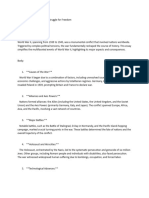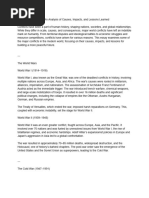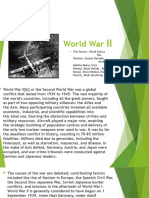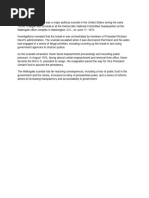WW2
WW2
Uploaded by
macohenCopyright:
Available Formats
WW2
WW2
Uploaded by
macohenCopyright
Available Formats
Share this document
Did you find this document useful?
Is this content inappropriate?
Copyright:
Available Formats
WW2
WW2
Uploaded by
macohenCopyright:
Available Formats
World War II was a global conflict that lasted from 1939 to 1945, involving most of the world's
nations, including the great powers, organized into two opposing military alliances: the Allies,
led by the United States, the Soviet Union, and the United Kingdom, among others, and the Axis
powers, primarily led by Nazi Germany, Imperial Japan, and Fascist Italy.
The war was triggered by a complex set of factors, including unresolved issues from World War
I, the rise of totalitarian regimes in Europe and Asia, territorial ambitions, and economic
instability. Key events leading to the war included the German invasion of Poland in 1939, which
prompted the Allies to declare war on Germany, and the Japanese attack on Pearl Harbor in
1941, drawing the United States into the conflict.
World War II was characterized by widespread devastation, large-scale military operations on
land, sea, and air, and the systematic targeting of civilian populations. The war saw the use of
new technologies, such as tanks, aircraft, and, most notably, atomic weapons, which were used
by the United States against Japan in 1945.
The war was fought on multiple fronts, including Europe, Africa, Asia, and the Pacific. Major
battles and campaigns included D-Day in Normandy, the Battle of Stalingrad, the Battle of
Midway, and the island-hopping campaign in the Pacific.
The Holocaust, the systematic genocide of six million Jews by the Nazis, and other atrocities
committed during the war underscored the human cost of the conflict and the depths of human
cruelty.
World War II ended in 1945 with the unconditional surrender of the Axis powers. The aftermath
of the war saw the establishment of the United Nations and the beginning of the Cold War
between the United States and the Soviet Union.
The impact of World War II was profound, reshaping the global political landscape, redrawing
national boundaries, and leading to the emergence of the United States and the Soviet Union as
superpowers. The war also accelerated decolonization movements in Asia and Africa and laid
the groundwork for the eventual establishment of the European Union.
The memory of World War II continues to influence international relations, with efforts to prevent
future conflicts through diplomacy, multilateral institutions, and the promotion of human rights
and peace.
You might also like
- A Brief History of ww2Document4 pagesA Brief History of ww2Radu EnacheNo ratings yet
- Note 2Document2 pagesNote 2itsmealirashadNo ratings yet
- Untitled DocumentDocument2 pagesUntitled DocumentfigsinxNo ratings yet
- Essay About World War 2Document2 pagesEssay About World War 2matchvollyballNo ratings yet
- Essey On World War 2Document2 pagesEssey On World War 2gustaf.lyckmanNo ratings yet
- World War II Causes Events and ConsequencesDocument1 pageWorld War II Causes Events and ConsequenceskrishnaNo ratings yet
- World War II EssayDocument2 pagesWorld War II Essayjquamina1234No ratings yet
- The Second World WarDocument2 pagesThe Second World WarikercoloniaNo ratings yet
- World War IIDocument2 pagesWorld War IItafolabi473No ratings yet
- World War II-A Brief OverviewDocument2 pagesWorld War II-A Brief OverviewveekshiNo ratings yet
- Assignment No 1-Iman FatimaDocument4 pagesAssignment No 1-Iman FatimaAli HassanNo ratings yet
- Landmark-Moments-in-World-War-2Document9 pagesLandmark-Moments-in-World-War-2atturabhinav.gNo ratings yet
- Yeni Metin BelgesiDocument2 pagesYeni Metin Belgesiegegurses631No ratings yet
- World War 2 NotesDocument10 pagesWorld War 2 Notesmaxweber0034No ratings yet
- Lecture-23-The World Wars and Clash of CivilizationsDocument4 pagesLecture-23-The World Wars and Clash of Civilizationshasan68jmNo ratings yet
- Mypdf 3Document2 pagesMypdf 31zrj3ga80aNo ratings yet
- World War 2Document2 pagesWorld War 2tajofatimaNo ratings yet
- WW 267878Document2 pagesWW 267878daftwellNo ratings yet
- World War II Its Background and ConsequencesDocument2 pagesWorld War II Its Background and ConsequencesSMA MAKARIOSNo ratings yet
- WW 2Document1 pageWW 2ahmednmustafa45No ratings yet
- WW2 HistoryDocument3 pagesWW2 Historyilean.tranxNo ratings yet
- World War IIDocument2 pagesWorld War IIrazorcodm69No ratings yet
- Public International Law and Human RightsDocument16 pagesPublic International Law and Human Rightsn9821531759No ratings yet
- Resumen 2da Guerra Mundial Chat GPTDocument2 pagesResumen 2da Guerra Mundial Chat GPTJuan RománNo ratings yet
- Title: World War II: A Global Struggle For FreedomDocument2 pagesTitle: World War II: A Global Struggle For FreedommachitidzenanikoNo ratings yet
- A Turning Point in Human HistoryDocument2 pagesA Turning Point in Human Historymarkus.zelenNo ratings yet
- Summary of World War IIDocument1 pageSummary of World War IIguneskaraca2000No ratings yet
- Freelance WorkDocument10 pagesFreelance WorkAbbas AlekberovNo ratings yet
- World War 2 Notes For Class PRDocument3 pagesWorld War 2 Notes For Class PRnixeyo2616No ratings yet
- World War IIDocument2 pagesWorld War IIhuseikha velayazulfahdNo ratings yet
- Effects of Second World War With Respect ToDocument6 pagesEffects of Second World War With Respect Tohumairaparkar6No ratings yet
- World War 2Document4 pagesWorld War 2zaindopasiNo ratings yet
- World War 2Document1 pageWorld War 2JACK ANTHONY VAZQUEZ HERNANDEZNo ratings yet
- The History of World War 2Document1 pageThe History of World War 2AaronNo ratings yet
- Untitled document (4)Document3 pagesUntitled document (4)139404No ratings yet
- WW 2Document2 pagesWW 2giberozashviliNo ratings yet
- Apuntes Segunda Guerra Mundial Trabajo InvestigaciónDocument8 pagesApuntes Segunda Guerra Mundial Trabajo Investigaciónhector.alonsoNo ratings yet
- World War ConsequencesDocument5 pagesWorld War Consequencescoachwrites4No ratings yet
- World War II (Often Abbreviated To WWII or WW2), Also Known As The Second World War, WasDocument2 pagesWorld War II (Often Abbreviated To WWII or WW2), Also Known As The Second World War, WasPopulară SălajNo ratings yet
- World Major conflicts - causes and impactsDocument5 pagesWorld Major conflicts - causes and impactscssarticles135No ratings yet
- World War II War (1 September 1939 - 2 SeptemberDocument7 pagesWorld War II War (1 September 1939 - 2 SeptemberjoshithavallabineniNo ratings yet
- Second World War SummaryDocument1 pageSecond World War Summarydy7mbdtt7nNo ratings yet
- World War 2 SummaryDocument1 pageWorld War 2 SummaryS.O.S LinguaphileNo ratings yet
- 1702407808Document1 page1702407808setopi8888No ratings yet
- Project of Cold WarDocument13 pagesProject of Cold WarSyed renobaNo ratings yet
- WH Analytical Research PaperDocument8 pagesWH Analytical Research Paperlauravilasboas2008No ratings yet
- EnglishDocument13 pagesEnglishadelisamulaj16No ratings yet
- World War IIDocument2 pagesWorld War IIcarlaalexandraNo ratings yet
- World War II (WWII or WW2), Also Known As The Second World War, Was ADocument2 pagesWorld War II (WWII or WW2), Also Known As The Second World War, Was AMoimen Dalinding UttoNo ratings yet
- 02 The Second World WarDocument1 page02 The Second World WarSenNo ratings yet
- World War IIDocument3 pagesWorld War IIDarshan M MNo ratings yet
- World War 2 PresentationDocument19 pagesWorld War 2 Presentationwaliwaliahmed138No ratings yet
- The Causes of World War 2 History EssayDocument5 pagesThe Causes of World War 2 History EssayEmilianPopescuNo ratings yet
- The Second World WarDocument3 pagesThe Second World WarIvan SalmoiraghiNo ratings yet
- Web and Application ProposalDocument5 pagesWeb and Application ProposalDarker Papuru848No ratings yet
- World War I A Pivotal Moment in HistoryDocument10 pagesWorld War I A Pivotal Moment in Historymuhammadshahzaib.98439No ratings yet
- WW2 Research TestDocument2 pagesWW2 Research TestRAFAEL HOMEM-DE-MELONo ratings yet
- HistoryDocument4 pagesHistoryReuben SequeiraNo ratings yet
- WatergateDocument1 pageWatergatemacohenNo ratings yet
- Louisiana purchaseDocument1 pageLouisiana purchasemacohenNo ratings yet
- WW1Document1 pageWW1macohenNo ratings yet
- french indian warDocument1 pagefrench indian warmacohenNo ratings yet
- \Document16 pages\macohenNo ratings yet
- cold warDocument1 pagecold warmacohenNo ratings yet
- Plato notes 12_1_24Document1 pagePlato notes 12_1_24macohenNo ratings yet
- Omalas NotesDocument1 pageOmalas NotesmacohenNo ratings yet
- DuBois 10 28Document1 pageDuBois 10 28macohenNo ratings yet
- mDocument1 pagemmacohenNo ratings yet
- mDocument1 pagemmacohenNo ratings yet






































































